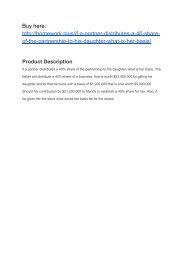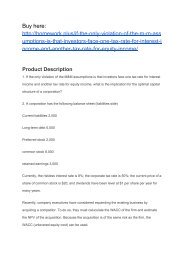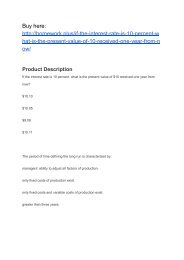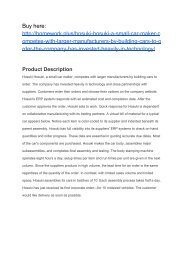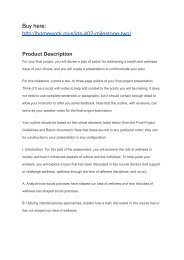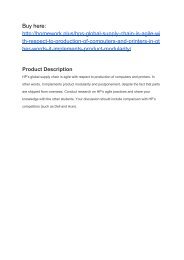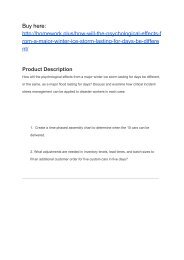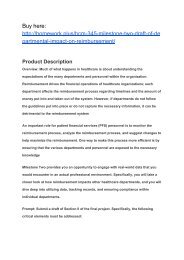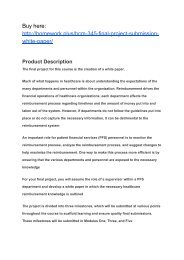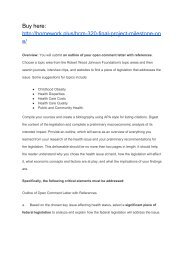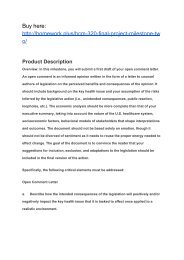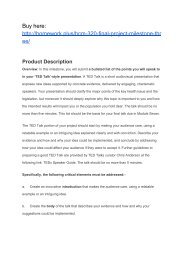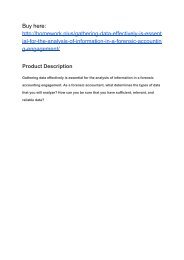Capstone Component Two: Professional Self-Assessment
Capstone Component Two: Professional Self-Assessment
Capstone Component Two: Professional Self-Assessment
Create successful ePaper yourself
Turn your PDF publications into a flip-book with our unique Google optimized e-Paper software.
Buy<br />
here:http://homework.plus/capstone-component-two-prof<br />
essional-self-assessment/<br />
Product Description<br />
●<br />
●<br />
<strong>Capstone</strong> <strong>Component</strong> <strong>Two</strong>: <strong>Professional</strong> <strong>Self</strong>-<strong>Assessment</strong><br />
Now that you have completed the three sets of tasks for S.N.H.U., LLC, you will write<br />
a professional self-assessment for the final component of your capstone. In this<br />
professional self-assessment, you will reflect on the capstone and your experience in<br />
the MS Accounting program as a whole. The professional self-assessment will serve<br />
as the formal introduction to your portfolio. This means that you should use the<br />
self-assessment as an opportunity to emphasize your strengths and employability. In<br />
addition, the professional self-assessment is an opportunity to explain how the<br />
portfolio artifacts that you developed showcase your superior accounting knowledge,<br />
skills, and expertise.<br />
●<br />
Remember that when prospective employers or admissions counselors view your<br />
portfolio, the professional self-assessment is the first thing they will see. It should be<br />
well organized, thoughtful, and effectively communicate your strengths in the field of<br />
accounting.<br />
●<br />
●<br />
Some of the issues that you could address in the final component of this capstone<br />
may include:<br />
●<br />
Ethics are a crucial component of the accounting profession. How can you relate<br />
ethics to your capstone and MS Accounting program experience? How can you<br />
maintain ethical principles in your future accounting career?<br />
●<br />
●<br />
What have you learned throughout the MS Accounting program and the capstone<br />
experience that prepares you for a job in an accounting firm or for further education?
●<br />
●<br />
How did you apply accounting best practices in your capstone experience?<br />
How will you apply what you have learned in the capstone and in the program to your<br />
future academic and/or professional life? In other words, how does this capstone fit<br />
intothe big picture of your academic and/or professional goals?<br />
●<br />
What unforeseen problems or obstacles did you encounter during your capstone<br />
experience? What challenges did you face? How did you address these?<br />
●<br />
Keep in mind that a client should be able to take your program and put it into practice without<br />
having to contact you to clarify what you intended by your recommendations or to explain<br />
parts of your program.<br />
Don't forget your explanation for WHY you listed and recommended what you did. Reference<br />
the concepts and theories covered in the course. Be sure to address why the program and<br />
exercises recommended are appropriate for the specific client given the clientÕs history,<br />
current abilities, and intended goal(s). For example: if you are developing a program for a<br />
beginner client without any resistance training experience, explain how your program<br />
addresses the lack of experience, initial need for foundational development, process by<br />
which you would safely progress the client, etc. Tying your program to course concepts is a<br />
critical component of your case study.<br />
Review the Client Profile below.<br />
Client Profile: Selina Kyle<br />
Age: 31<br />
Gender: Female
Resting Heart Rate: 70 bpm<br />
Height: 5'7"<br />
Weight: 159 lb<br />
Body Fat Percentage: 33%<br />
Background and Goals: Selina just had her first baby a couple months ago and is<br />
determined to shed excess pregnancy pounds before summer. Selina has very limited<br />
exercise experience. She did not play high school or college sports. Prior to having her first<br />
child, she did like to hike, go out dancing, and take the occasional yoga class. She is eager<br />
to start a program to lose the baby weight. She can dedicate 3 or 4 days per week to<br />
exercise and is willing to sign on for 12 weeks to start.



